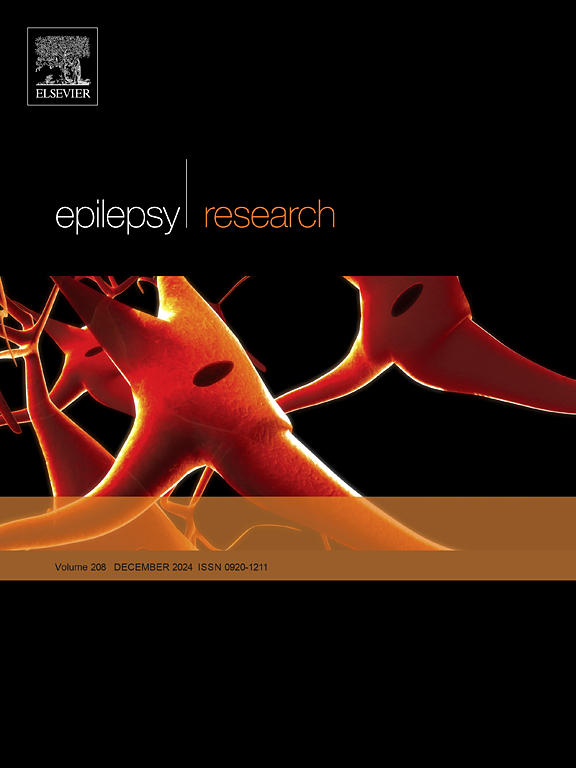癫痫患者吸食大麻、睡眠和情绪障碍--加拿大一家三级护理癫痫中心的临床和多导睡眠图研究
IF 2
4区 医学
Q3 CLINICAL NEUROLOGY
引用次数: 0
摘要
目的随着娱乐性和医用大麻使用率的上升,人们对大麻素抗癫痫特性的兴趣与日俱增,尤其是在加拿大。在最近一项针对癫痫患者(PWE)的研究中,大麻的使用与不良的社会心理健康密切相关。睡眠和情绪并发症在癫痫患者中非常普遍,也是吸食大麻的常见动机。本研究的主要目的是评估经常使用大麻的癫痫患者与不使用大麻的癫痫患者在人口统计学、主观和客观评估的睡眠质量和情绪方面的差异。收集了详细的癫痫相关数据和自我报告的睡眠[匹兹堡睡眠质量指数(PSQI)]、埃普沃斯嗜睡量表(ESS)]、情绪[贝克抑郁量表(BDI)和贝克焦虑量表(BAI)]以及大麻使用相关数据。入院第一晚进行了夜间多导睡眠图(PSG)检查,并同时进行了 18 通道视频脑电图检查。结果在 51 名发作控制情况相似的患者中,有 25 人(13 名女性)报告吸食大麻(平均年龄为 36.3+14.8 岁),他们的年龄明显小于 26 名(18 名女性)非吸食者(平均年龄为 48.3+15 岁)。吸食大麻者的主观睡眠质量明显更好(平均 PSQI 分数分别为 7.2+2.9 与 10.2+5.2)。大多数患者都认可嗜睡(吸食大麻者的ESS评分大于10;91.3%,非吸食者为77.3%)和中度至极度抑郁(BDI)评分。在客观睡眠参数方面没有观察到明显差异。在多重逻辑回归分析中,BDI 分数可明显预测 PSQI 和 ESS 分数。意义尽管存在明显的年龄差异,但与不吸食大麻者相比,报告经常吸食大麻的残疾人自我报告的睡眠质量更好。然而,根据 PSG 的客观睡眠数量和质量,两组之间没有明显差异。此外,抑郁症状的严重程度也是影响残疾人睡眠质量和白天过度嗜睡的一个重要预测因素。本文章由计算机程序翻译,如有差异,请以英文原文为准。
Cannabis use, sleep and mood disturbances among persons with epilepsy – A clinical and polysomnography study from a Canadian tertiary care epilepsy center
Objective
Interest in anti-seizure properties of cannabinoids is increasing, with the rise in prevalence of recreational and medical cannabis use, especially across Canada. In a recent study on people with epilepsy (PWE), cannabis use showed a strong association with poor psychosocial health. Sleep and mood comorbidities are highly prevalent in epilepsy, and are common motivations for cannabis use. The primary objective of this study was to assess demographic, subjective and objectively assessed sleep quality and mood related differences among PWE who regularly use cannabis compared to those who do not.
Methods
Consecutive consenting patients with a confirmed epilepsy diagnosis, admitted to our Epilepsy Monitoring Unit, over a 3-year period (2019–2022) were enrolled. Detailed epilepsy-related data and self-reported sleep [Pittsburgh Sleep quality index (PSQI)], Epworth Sleepiness Scale (ESS)], mood [(Beck’s Depression Inventory (BDI) and Beck’s Anxiety inventory (BAI)] and cannabis use related data were collected. Overnight polysomnography (PSG) was conducted on the first night of admission, with simultaneous 18-channel video-EEG. Sleep (PSG) scoring followed American Academy of Sleep Medicine guidelines by a scorer blinded to clinical details.
Results
Among 51 patients with similar seizure control, 25 (13 F) reported cannabis use (mean age 36.3+14.8 years) and were significantly younger than 26 (18 F) non-users (mean age 48.3+15 years). Cannabis users had significantly better subjective sleep quality (mean PSQI scores 7.2+2.9 vs 10.2+5.2 respectively). Most patients endorsed sleepiness (Cannabis users with ESS scores greater than 10; 91.3 %, 77.3 % in non-users) and moderate to extreme depression (BDI) scores. No significant differences were observed in objective sleep parameters. BDI score significantly predicted PSQI and ESS scores on multiple logistic regression analysis.
Significance
Despite a significant age difference, self-reported sleep quality is better among PWE who report regular cannabis use compared to non-users. However, there is no significant difference in objective sleep quantity and quality from PSG between the two groups. Additionally, severity of depressive symptoms is a significant predictor of sleep quality and of excessive daytime sleepiness among PWE.
求助全文
通过发布文献求助,成功后即可免费获取论文全文。
去求助
来源期刊

Epilepsy Research
医学-临床神经学
CiteScore
0.10
自引率
4.50%
发文量
143
审稿时长
62 days
期刊介绍:
Epilepsy Research provides for publication of high quality articles in both basic and clinical epilepsy research, with a special emphasis on translational research that ultimately relates to epilepsy as a human condition. The journal is intended to provide a forum for reporting the best and most rigorous epilepsy research from all disciplines ranging from biophysics and molecular biology to epidemiological and psychosocial research. As such the journal will publish original papers relevant to epilepsy from any scientific discipline and also studies of a multidisciplinary nature. Clinical and experimental research papers adopting fresh conceptual approaches to the study of epilepsy and its treatment are encouraged. The overriding criteria for publication are novelty, significant clinical or experimental relevance, and interest to a multidisciplinary audience in the broad arena of epilepsy. Review articles focused on any topic of epilepsy research will also be considered, but only if they present an exceptionally clear synthesis of current knowledge and future directions of a research area, based on a critical assessment of the available data or on hypotheses that are likely to stimulate more critical thinking and further advances in an area of epilepsy research.
 求助内容:
求助内容: 应助结果提醒方式:
应助结果提醒方式:


